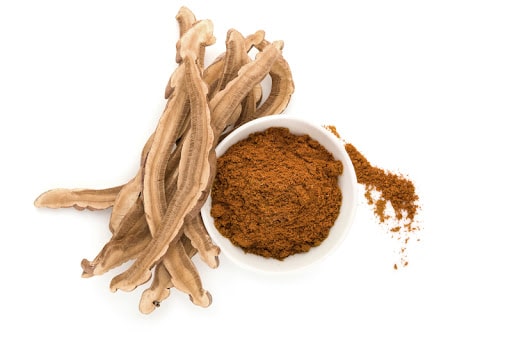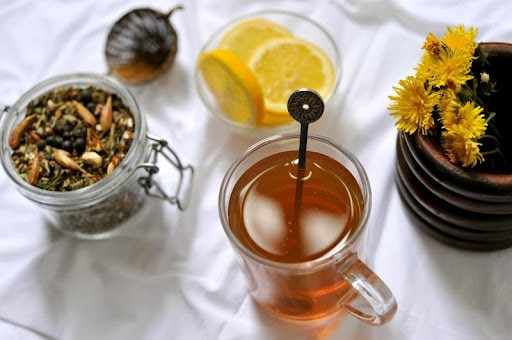Today, healthy routines are often measured by whether we’ve closed the circles on our smart watch, measured our macros correctly, or passed up on a sweet afternoon treat to keep our bodies in balance.
It’s not so often that we consider the quality of our sleep as a measure of good health.
But, the science is sound: our sleep - how many hours we get, how deeply we sleep, and whether we maintain a “regular” sleep schedule - is actually one of the cornerstones of maintaining balance and well-being.
If you experience insomnia, restlessness, or just feel that you could benefit from positive sleep habits - have no fear. There are many ways to support healthy sleep cycles without resorting to addictive pharmaceuticals and sleep-aids.
Today, we explore how natural herbal remedies can help promote restful sleep (and provide a host of other benefits) and keep our cycles in harmony.
Effects of Poor Sleep on Health
First, the bad news. A poor night’s sleep every once in a while happens to everyone, and that’s okay. The next day you may feel groggy or have trouble concentrating, but typically the sporadic sleepless night can be remedied with good rest and recovery over the next several days.
However, chronic “bad” sleep can be extremely detrimental to our overall health.
Negative effects of poor sleep can include:
-
- Increased risk of diabetes, heart attacks, or strokes
-
- High blood pressure
-
- Weight gain and obesity
-
- Weakened immune health
-
- Mood changes, including anxiety and depression
-
- Trouble with concentration and critical thinking
-
- Memory loss
It’s estimated that about one-third of American adults struggle with sleep deprivation, a trend that has worsened over the years. Chronic stress, environmental stressors, and overstimulation are all contributors to these trends, making it harder for us to fall and stay asleep.
To combat poor sleep, we often reach for caffeine to mask the symptoms of sleep deprivation, or turn to addictive prescriptions to help us sleep. However, these solutions mask the problem and build chemical dependencies instead of working to address the root causes of our sleeplessness.
Now for the good news: there are natural, effective ways to nourish our bodies for better sleep that have been practiced for thousands of years.
By turning to natural solutions for sleep, we can improve sleep cycles, increase our energy levels, and improve our cognition while bringing our minds and bodies back in sync with our natural cycles.
Sleep Remedies in Traditional Chinese Medicine
There are numerous practices and remedies in Traditional Chinese Medicine that support relaxation, regeneration, and sleep.
Acupuncture, for one, can be used to support rest. In acupuncture, a practitioner will apply thin needles to specific points along the surface of a patient’s skin. Studies have shown that acupuncture can help regulate the central nervous system and promote the release of serotonin, helping to balance sleep patterns.
Herbs are another common sleep remedy used in Traditional Chinese Medicine. By promoting a more relaxed state of mind and balancing our natural responses to stress, herbal remedies can improve our sleep cycles, balance our energies, and foster restful sleep.
In Traditional Chinese Medicine, this is reflected by the inner balance of “yin” and “yang” energies. These energies are constantly in flux, and depend on one another to maintain balance.
By day, our Yang energies should stimulate and warm us, energizing our activities throughout the day. At night, our Yin energies should gently take over, calming and restoring the body as we regenerate and rest for another day.
Natural remedies are the best way to cultivate a balance in our energies and promote sustainable health.
How Herbs Can Help Promote Better Sleep
Scientifically speaking, herbs can promote better sleep by helping the body to adapt to stress, regulating hormonal imbalances, detoxifying the body, and helping our bodies to maintain homeostasis.
By reducing the effects of stress on our body, we are less likely to remain in “fight or flight” mode, which elevates blood pressure and levels of cortisol and Adrenaline in our bodies.
The more our internal systems are balanced, the more able we are to sleep soundly and rest.
Like any natural ingredient, different herbs have different benefits, dictated by their makeup of vitamins, minerals, and active compounds. Below, we explore the best calming herbs to promote relaxation and sleep.
The 8 Best Calming Herbs for Sleep
Natural herbal remedies are great for improving sleep cycles, quality of sleep, and promoting lasting energy throughout the day. As opposed to sleeping pills, they have a host of other benefits and are non-habit forming, making these herbs a great go-to for better rest:
1. Ashwagandha
Ashwagandha has long been used in Traditional Chinese Medicine, and today this adaptogenic herb is gaining popularity for its ability to moderate stress and anxiety. Studies of Ashwagandha have also shown that this herb may help individuals to fall asleep faster, stay asleep longer, and experience higher-quality sleep.
Ashwagandha contains several compounds that likely contribute to its restful benefits: triethylene glycol, for one, may help to promote physiologically sound sleep. Ashwagandha additionally contains withanolides, active ingredients that help to reduce stress in the body. By promoting overall relaxation, ashwagandha can help support better rest.
Studies additionally support the ability of ashwagandha to help protect the body against oxidative stress, promote energy, enhance memory, and reduce inflammation.
2. Valerian
The roots of valerian plants, an herb native to Asia and Europe, has been found to be an effective natural sleep aid. These roots are filled with active compounds that help to ease stress, anxiety, and reduce inflammation. Studies have shown that valerian root can help people fall asleep faster and improve sleep quality by promoting deeper sleep.
3. Passionflower
Originating in South America, Passionflower is believed to help balance feelings of anxiety and pain by increasing levels of gamma-aminobutyric acid (GABA).This chemical helps the body and mind to regulate our mood and produce a calming effect. Studies have shown that passionflower can help induce sleep, prolong sleep, and help deepen sleep and improve sleep quality.
4. Holy Basil
Holy Basil has many uses in natural medicine. An adaptogenic herb, studies have shown that holy basil can help to lower stress in the body, improve energy levels, and relieve fatigue.
The benefits of holy basil come from active compounds in the herb that help to lower levels of stress hormones in the body. One such hormone is cortisol, which is released from the adrenal glands when someone is under stress - high levels of cortisol can disrupt sleep cycles and cause individuals to awaken in the middle of the night.
Holy basil can help to control levels of cortisol in the body and facilitate restful sleep.
5. Reishi Mushrooms
Reishi mushrooms, known as a Superior Herb in Traditional Chinese Medicine, are known for their ability to nourish Heart Qi, or energy, to promote rest. An adaptogenic herb, reishi mushrooms contain naturally occurring compounds that help to mitigate the effects of stress and support a feeling of calm.
Multiple studies show the benefits of reishi mushrooms for sleep; these mushrooms have exhibited the ability to help individuals sleep longer, increase non-rapid eye movement sleep, and decrease the time it takes to fall asleep.
6. Coral Lily Bulb
Lily Bulb, or Bai He, is believed to nourish Yin energy and provide cooling benefits in Traditional Chinese Medicine. Used for centuries in natural remedies, these bulbs are known for their properties that help to promote restful sleep, reduce fevers, and improve concentration (among other benefits).
7. Jujube Seeds
Jujube seeds are considered an essential herb in Traditional Chinese Medicine for supporting relaxation, soothing stress, and increasing overall calmness.
Jujube seeds are packed with nutrients, and possess antioxidant properties that can reduce oxidative stress and inflammation in the body. The saponins and flavonoids in jujube seeds additionally impact neurotransmitters in the brain, ultimately helping us to fall and stay asleep.
8. Chinese Licorice
While today licorice is known as a popular candy, Chinese Licorice Root has been used for years in Chinese, Egyptian, Middle Eastern, and Greek medicine to soothe the digestive system and reduce inflammation in the body.
Glycyrrthizin, the main active compound in licorice root, is known for its antioxidant and anti-inflammatory properties, which can help ease physical stress and promote relaxation.
How to Take Herbal Sleep Supplements
Herbal sleep supplements can be taken as tinctures, pills, or in a tea.
Containing Chinese Licorice, Reishi, Jujube Seeds, and Coral Lily Bulbs, our Mind Unwind relaxation superblend is a great, natural pill filled with calming herbs to help manage stress, support relaxation, and balance sleep cycles. The herbs in our formula also help to improve concentration and cognition, making days more focused and nights more restful.
With any herbal supplement, regular use is recommended to achieve the best results.
Take it from us - you need your sleep. For a natural way to sleep better without waking up in a fog, adaptogens and calming herbs are an excellent option to get your balance back and catch some zzz’s, the way nature intended.



